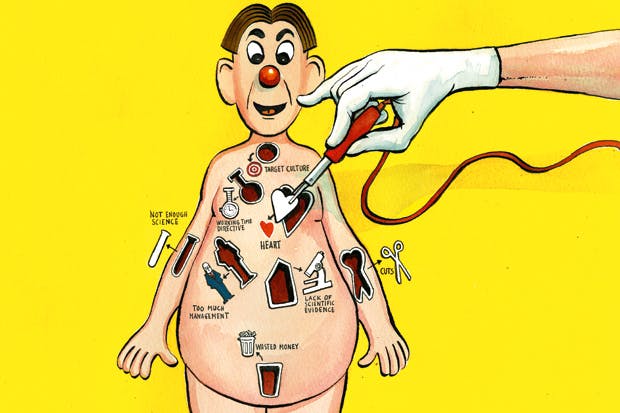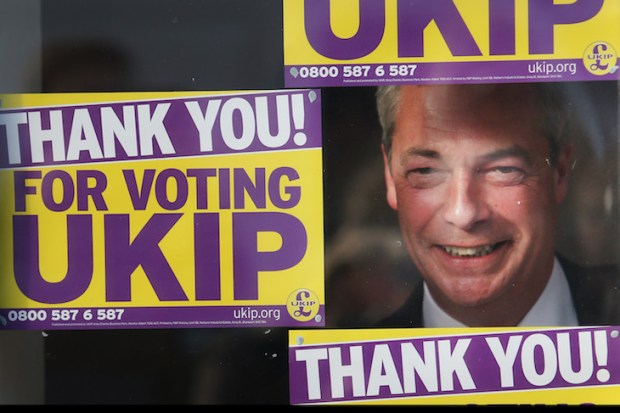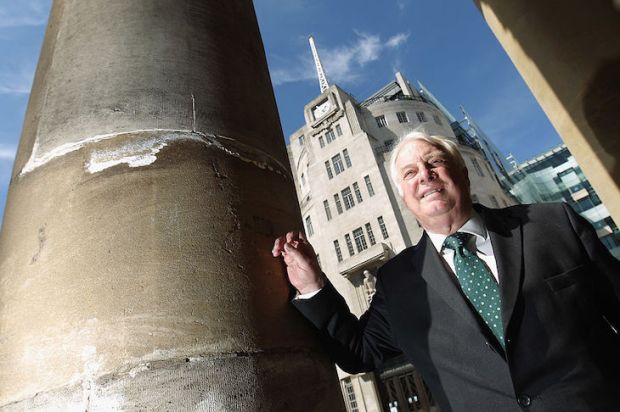‘Let’s make the rich pay more.’ Does that sound so right-wing? To me it has a positively socialist ring. It should appeal to egalitarians: to those who call themselves socially concerned and seek new ways to redistribute wealth.
So why not apply it for the NHS? Let’s make the rich pay more for health care.
I’m no health policy wonk. I chip in with just this one small suggestion, which is not really about market-based reform of our health service, but about how to sell the idea to a deeply reactionary electorate.
The British are positively neuralgic on health. They shudder at the use of words like ‘profit’. Expressions such as ‘privatise’, ‘charge’ or ‘insurance’ are incendiary in our health politics. As a result, both major parties are paralysed. The Tories are paralysed by fear of being thought to threaten the NHS; Labour’s paralysis is born of the stupefying knowledge that all they need do to show they care is promise to protect the institution from change.
How, then, to break this political stasis? We need a populist argument — something that will appeal to the masses — for charging some people for access to our health service. What better approach than the cry that the rich are hitching a free ride on an already overcrowded wagon? Instead of talking about how to protect the poor, why don’t we talk about how to sting the rich?
In a public service for which swelling demand exceeds supply, the richer among us (who tend to be older) are hogging scarce resources, crowding out younger, poorer patients while demanding that we the better-off should carry on getting our health care ‘free at the point of use’. Why should it be seen flintily right-wing to find this objectionable?
Whatever else may be its demerits, the proposal for a ‘mansion tax’ is hardly thought to be an assault on the poor. So how about a mansion-tax equivalent for health? If we could reframe the argument as an argument for making the rich pay extra, we might begin to crack the ice that has formed across this issue, freezing debate. We might begin to free up thinking.
I get free travel on all public transport in London at all times. This is a pensioner benefit that’s worth more than £2,000 a year to me, even if I earn ten times as much as the fare-paying poor. I also get a winter fuel allowance. My literary agent jokes that his buys just enough fuel to fill the Bentley. The argument that it’s a disgrace to shower benefits like these on the rich comes typically from the left — the socially concerned — not the right.
If anything, the case is stronger when we turn to health provision. My winter heating is not making anyone else colder, nor my travel concessions depriving anyone else of a ride: but in health, where resources are overstretched, the better off are adding to queues and waiting times and degrading the quality of provision by hoovering up a free public service.
The most cogent objection to my line of reasoning is, of course, that the rich already do pay — and pay more — for health care because health care is funded through general taxation. I acknowledge this, but simply take the moral reasoning forward by proposing another way for the rich to pay, and relating it, this time, to their actual call on the service. We do need to put more money into health. It will have to come disproportionately from the better off. The only question is by what means we extract it from them — general taxation alone, or charges for use too?
The advantage of the latter approach is that charging will have a secondary effect of reducing richer people’s demand on the NHS. Not only will these citizens think harder about whether and when they need to call on the health service, but some of them — being obliged to pay for provision, whether state or private — will go private. Here would be an impost that conferred a double benefit on the NHS, simultaneously reducing demand and increasing funding.
My case is strong, my argument obvious. Others have been advancing it since the NHS was founded. Except as regards prescription charges (which were fiercely fought) the argument has made no progress; so we have to conclude that the national mind is set against it. The way to change a nation’s mind is either by catastrophe — which God spare us in the case of the NHS — or by stealth.
Stealth requires politicians not to be greedy or impatient, and to think long-term. The poll tax, a sound idea in principle, was sunk by the Treasury’s refusal to underwrite the only strategy by which it could have been sneaked in: to make the charge small to the point of being derisory at first. Later, once the principle had been accepted, it could have been steadily hiked up. Another sound idea, electronic road-pricing, will only ever be accepted by offering motorists a huge cut in vehicle or fuel tax in return for relatively light charges on road use. Later, all three could be hiked up — but only once the principle of road charging had been accepted and the idea normalised.
So it will be for health charges. To sneak the idea in, they will have to be imposed only on a small minority: the seriously well off — perhaps those paying the very top rate of taxation — and tapered. The change may even cost more than at first it yields. Later…
In health, ‘make the rich pay’ would be the thin end of the wedge. But it is the right wedge, and if thin enough, and if hammered in with the assistance of a little good old British class hatred, the idea would in time become normalised. Only thus, and very gradually, could we sneak reason back into health policy.

Join us on 17 March to discuss whether anyone can save the NHS. Speakers include Andy Burnham, shadow secretary of health. This event has been organised by The Spectator in collaboration with Pfizer. More information can be found here.
Got something to add? Join the discussion and comment below.
Get 10 issues for just $10
Subscribe to The Spectator Australia today for the next 10 magazine issues, plus full online access, for just $10.















Comments
Don't miss out
Join the conversation with other Spectator Australia readers. Subscribe to leave a comment.
SUBSCRIBEAlready a subscriber? Log in